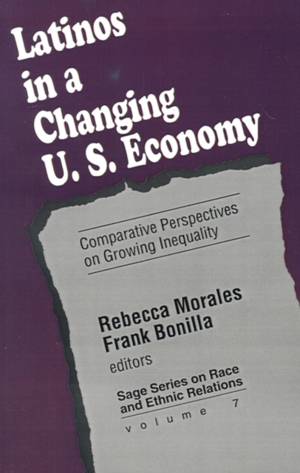
- Retrait gratuit dans votre magasin Club
- 7.000.000 titres dans notre catalogue
- Payer en toute sécurité
- Toujours un magasin près de chez vous
- Retrait gratuit dans votre magasin Club
- 7.000.0000 titres dans notre catalogue
- Payer en toute sécurité
- Toujours un magasin près de chez vous
Latinos in a Changing Us Economy
Comparative Perspectives on Growing Inequality
216,95 €
+ 433 points
Description
The 1980s were not good economic times for Latinos in the United States. The contributors to Latinos in a Changing U.S. Economy examine the cause of this phenomenon and the long-term consequences for the Hispanic population. How much, they wonder, can be attributed to racism, to structural barriers, to the demographics of the Latino population, or to the structure of the new global economy? Is there evidence of a persistent and growing inequality in the socioeconomic position of Latinos? Using both national data and a series of case studies from cities with significant Latino populations such as New York, Los Angeles, San Antonio, Chicago, and Miami, the editors identify the widening gap in income and social status between rich and poor, Anglos and Latinos, men and women, and immigrants and native born. These celebrated scholars also document the importance of including Latino populations in the study of--and policies for--improving urban areas. They suggest policy options that will reverse the growing social inequality. As an overview of the current socioeconomic status of Latinos in the United States, this book will be useful for scholars and students in urban studies, Latino studies, economics and society, stratification, and ethnic relations. "This is the most useful volume available on Latinos in the 1980′s. . . . Individual articles are, in fact, so well blended that they could easily have been written by a single author. This collection is highly recommended to the general public, policy makers, students, and academics. Excellent references and footnotes." --Choice "The book makes three major contributions. First, it gives us the historical background. . . . Second, the essays provide the reader with a thorough understanding of the different experiences of various Latino subpopulations. . . . Third, they underscore the critical role of immigration and policies toward immigrants in the restructuring process." --Contemporary Sociology "At last! Latinos in a Changing U.S. Economy offers the most comprehensive appraisal of the challenges faced by the second largest minority in the United States. The collection of lucidly written articles, mostly by Latino scholars, reexamines the past in light of present transformations and pinpoints trends likely to characterize the future. A must for scholars and policy thinkers who would like to enrich their understanding for the highly diverse Latino population." --M. Patricia Fernández Kelly, The Johns Hopkins University "Mexican Americans, Puerto Ricans, Cubans, Dominicans; migrants and immigrants; Los Angeles, New York, Chicago, San Antonio, Miami: these diverse ethnicities, statuses, and urban bases reflect the changing faces of Latinos in the U.S. in the last decade of the 20th century. In this volume, Frank Bonilla, the dean of Latino Studies in the U.S., leads a corp of distinguished, mostly Latino, scholars to explore the effect of recent structural changes on Latinos, soon to be America′s largest minority group. Of particular concern to the authors are patterns of persistent and growing poverty and inequality among most Latinos. Familiar issues, such as market forces, racial and ethnic barriers, education and other ′human capital′ factors, are re-examined from new angles, with new data, and most importantly, from regional (urban) perspectives, while new issues, such as Latinos and environmental justice, are also introduced. "The new Clinton Administration would do well to study these essays to gain a better understanding of Latinos, as it formulates new policies to address America′s most urgent domestic problems, such as the stagnant economy, urban decay, deteriorating race relations, and growing inequality between whites and peoples of color." --Evelyn Hu-DeHart, Professor and Director, Center for Studies of Ethnicity and Race in America, University of Colorado at Boulder "This book is a landmark contribution. It fills a void in our understanding of the place of Latinos in U.S. society. . . . The combining of historical narrative, dynamic conceptualization of measured wage discrimination, studies of Latino communities of place by resident scholars--Los Angeles, Chicago, Miami, San Antonio--provides a breadth and wealth of comparative insight which sets the standard for future researchers." --William K. Tabb, CUNY Graduate Center "College-level collections specializing in Latino issues will want to add this to their collections: It provides a strong social and political overview of Latinos and how they are affected by economic change in this country, considering national data and urban case histories to examine gaps in income and status between whites and Latinos." --The Bookwatch
Spécifications
Parties prenantes
- Editeur:
Contenu
- Nombre de pages :
- 280
- Langue:
- Anglais
- Collection :
- Tome:
- n° 7
Caractéristiques
- EAN:
- 9780803949249
- Date de parution :
- 25-02-93
- Format:
- Livre broché
- Format numérique:
- Trade paperback (VS)
- Dimensions :
- 141 mm x 215 mm
- Poids :
- 371 g

Les avis
Nous publions uniquement les avis qui respectent les conditions requises. Consultez nos conditions pour les avis.





